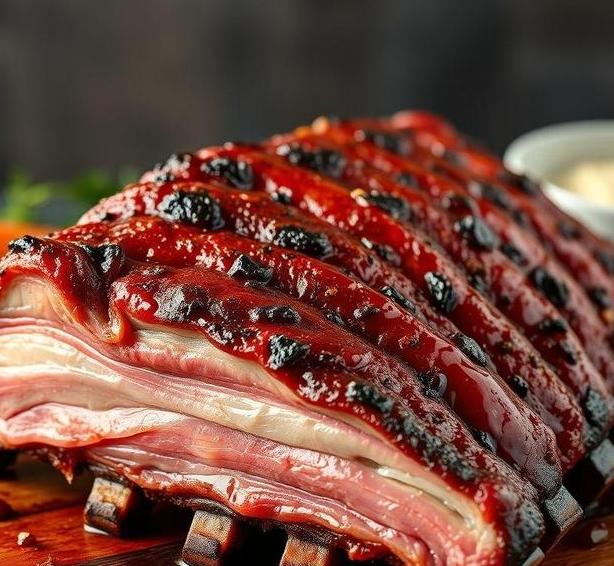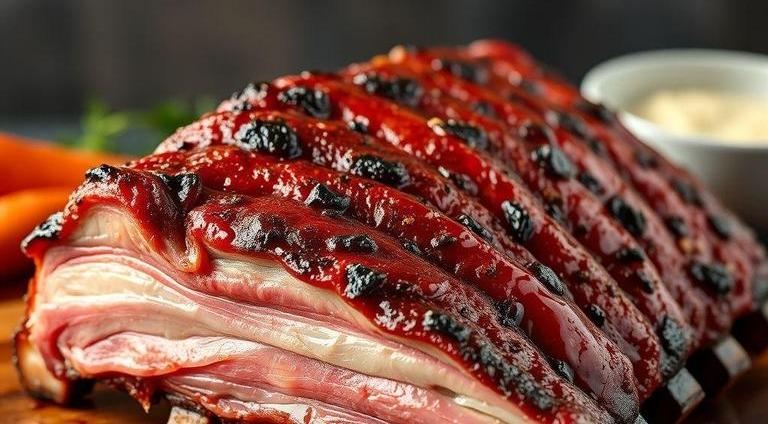Pork baby back ribs, with their tender, flavorful meat, have earned a well-deserved reputation as one of the most mouthwatering cuts of meat. Whether you’re cooking them on the grill, smoking them low and slow, or roasting them in the oven, pork baby back ribs are a true crowd-pleaser. However, like any perishable food, they have a limited shelf life and can go bad if not properly stored or consumed in time.
Understanding how long these ribs last, recognizing the signs of spoilage, and knowing the proper storage methods can save you from the unfortunate experience of biting into a spoiled piece of meat. In this guide, we’ll dive into everything you need to know about how to properly handle and store pork baby back ribs, so you can enjoy them at their best every time.
Can Pork Baby Back Ribs Go Bad?
Yes, pork baby back ribs can go bad, just like any fresh meat. While they’re delicious when fresh and cooked properly, they are highly susceptible to bacterial growth, especially when left in the wrong conditions for too long. Spoiled pork ribs don’t just taste bad; they can pose health risks due to bacteria like Salmonella or E. coli, which can lead to foodborne illnesses if consumed.
Meat naturally has a limited shelf life. Fresh pork ribs should be handled with care and consumed within a certain timeframe. Once cooked, their shelf life is further reduced. Even if stored in the fridge or freezer, pork ribs can lose quality and safety over time if not properly maintained. It’s crucial to know when they are at risk of going bad and what to look out for.
Shelf Life For Pork Baby Back Ribs

The shelf life of pork baby back ribs depends on several factors: whether they are raw or cooked, how they are stored, and the condition of the meat when purchased. Here’s a breakdown of expected shelf life based on different scenarios:
-
Raw Pork Baby Back Ribs
- Refrigerator: If stored properly in the fridge at 40°F (4°C) or below, raw pork ribs typically last 3-5 days.
- Freezer: For longer storage, raw ribs can last in the freezer for 4-6 months. However, for the best quality, it’s advisable to consume them within 3 months.
-
Cooked Pork Baby Back Ribs
- Refrigerator: Cooked ribs will stay fresh for 3-4 days in the fridge.
- Freezer: If you freeze leftover cooked ribs, they can last up to 2-3 months. The texture may change slightly after thawing, but they should still be safe to eat.
-
Uncooked Pork Baby Back Ribs (Vacuum-Sealed)
- If vacuum-sealed and properly refrigerated, these can last a bit longer, up to 7-10 days depending on the manufacturer’s guidelines, but it’s always best to check the ’sell by’ or ’use by’ date.
Common Signs Of Spoilage
Knowing how to identify when pork baby back ribs have gone bad is crucial for food safety. While it’s easy to rely on smell and taste, there are several signs you should look for visually and by touch:
-
Off Smell
- Fresh pork ribs will have a mild, slightly sweet smell. If the ribs have a strong sour or rancid odor, it’s a clear sign they’ve spoiled.
-
Discoloration
- Fresh ribs are typically a pale pink or light red. If you notice any gray, greenish, or brownish hues, it’s a sign the meat is decomposing. Sometimes a slight color change may happen in the fridge, but a significant shift towards brown or gray is a red flag.
-
Slimy Texture
- When the ribs are still good, they should feel firm and slightly moist but not slimy. A slimy texture is a clear indication that bacteria have begun to grow and break down the meat.
-
Off Taste
- If you happen to cook ribs that look okay but taste off, toss them immediately. Never risk consuming meat that has an unpleasant taste, as it can lead to food poisoning.
-
Leaky Packaging
- If the packaging is broken or punctured, air can enter and promote bacterial growth. It’s best not to consume meat from a damaged package, even if it appears fresh at first glance.
How To Store Pork Baby Back Ribs?

Proper storage is key to keeping your pork ribs safe and delicious. Here are the best practices to follow for storing both raw and cooked ribs:
For Raw Ribs
-
Refrigeration
- Store raw ribs in their original packaging if unopened. If opened, transfer them to an airtight container or tightly wrap them in plastic wrap or aluminum foil to prevent exposure to air, which can speed up spoilage.
-
Freezing
- If you’re not planning to use the ribs within a few days, freezing is your best option. Wrap the ribs tightly in plastic wrap, then foil, or place them in a freezer-safe bag. This dual-layer will protect the meat from freezer burn and help maintain quality. Be sure to label with the date of freezing.
For Cooked Ribs
-
Refrigeration
- After cooking, let the ribs cool completely before placing them in an airtight container or wrapping them tightly with plastic wrap or foil. This prevents bacteria from forming due to condensation.
-
Freezing
- To freeze cooked ribs, first wrap them tightly in plastic or aluminum foil. You can also use a vacuum sealer for best results. Ensure to consume them within 2-3 months for optimal taste. When reheating, be sure to check the internal temperature to ensure it reaches 165°F (74°C) for food safety.
General Tips For Both
- Avoid Cross-Contamination: Always store raw pork ribs away from ready-to-eat foods in the fridge to prevent cross-contamination of harmful bacteria.
- Temperature Consistency: Ensure that your fridge or freezer is operating at the proper temperature. Your fridge should be at or below 40°F (4°C), and your freezer should be set to 0°F (-18°C).
Expert Tips
- Use Ice Packs for Transport: If you’re transporting raw ribs to a cookout or BBQ, place them in a cooler with ice packs to keep the temperature low and prevent bacterial growth.
- Vacuum-Sealing for Longer Storage: If you frequently purchase pork baby back ribs in bulk, investing in a vacuum sealer can extend the shelf life of your ribs, especially in the freezer. Vacuum-sealed ribs will last months longer than those in regular plastic wrap.
- Thaw Properly: When thawing frozen ribs, the best method is to place them in the fridge overnight. If you’re in a hurry, you can also thaw them in cold water, but never thaw them at room temperature, as this can lead to bacterial growth.
- Cook Ribs Thoroughly: Undercooking pork is a health risk. Always cook pork baby back ribs to an internal temperature of 145°F (63°C) with a 3-minute rest time before serving. For fall-off-the-bone tenderness, many grillers prefer to cook ribs to an internal temperature of 190-203°F (88-95°C), but always ensure they’re well done to avoid foodborne illnesses.
FAQs
Can Pork Baby Back Ribs Go Bad In The Fridge?
Yes, pork baby back ribs can go bad in the fridge if not stored properly. Typically, they can last 3-5 days in the refrigerator when kept at or below 40°F (4°C). After this time, the meat can start to spoil, developing off smells, changes in color, or a slimy texture.
How Can I Tell If Cooked Pork Baby Back Ribs Have Gone Bad?
To tell if cooked pork baby back ribs have gone bad, check for any signs of spoilage such as a sour or rancid smell, discoloration (especially grayish or greenish hues), and a slimy texture. If any of these signs are present, it’s best to discard the ribs.
Can Pork Baby Back Ribs Go Bad After Freezing?
While freezing pork baby back ribs can significantly extend their shelf life, they can still go bad if left in the freezer for too long. For best quality, cooked or raw ribs should be consumed within 4-6 months. After this time, they can develop freezer burn or lose flavor.
What Is The Shelf Life Of Raw Pork Baby Back Ribs?
Raw pork baby back ribs can last in the fridge for about 1-2 days. For longer storage, it’s recommended to freeze them. Make sure they are properly wrapped to avoid contamination or freezer burn.
How Should I Store Pork Baby Back Ribs To Prevent Them From Going Bad?
To store pork baby back ribs and prevent spoilage, wrap them tightly in plastic wrap or aluminum foil, and then place them in an airtight container or a resealable plastic bag. This prevents exposure to air and bacteria, keeping the ribs fresh longer.
Can I Eat Pork Baby Back Ribs If They Smell Bad But Are Cooked?
No, you should not eat pork baby back ribs if they smell bad, even if they have been cooked. A foul odor is a strong indicator that the meat has spoiled and could pose a risk for foodborne illness.
Is It Safe To Eat Leftover Pork Baby Back Ribs After A Week In The Fridge?
No, it is not safe to eat leftover pork baby back ribs after a week in the fridge. The general guideline for cooked meat storage is 3-4 days. After that, the risk of bacterial growth increases, even if the ribs are refrigerated.
Can Bacteria Grow On Pork Baby Back Ribs If They Are Left Out Too Long?
Yes, bacteria can grow rapidly on pork baby back ribs if left out at room temperature for more than 2 hours. If the temperature exceeds 90°F (32°C), the safe limit is reduced to just 1 hour. It’s important to refrigerate or freeze ribs promptly after cooking.
Do Pork Baby Back Ribs Go Bad Faster If They Are Marinated?
Marinating pork baby back ribs does not necessarily make them go bad faster, but it can affect their shelf life if they are not stored correctly. The acidic nature of some marinades can actually help preserve the ribs, but they should still be consumed within the same timeframe as non-marinated ribs.
Can Pork Baby Back Ribs Go Bad Even If They Look Fine?
Yes, pork baby back ribs can still go bad even if they look fine. Bacteria, mold, or spoilage can occur inside the meat without visible signs. If the ribs have been stored for too long or under improper conditions, they may not be safe to eat, even if they appear visually acceptable.